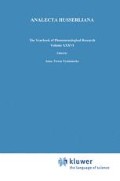Abstract
In keeping with one of the announced purposes of this Congress (and most likely the main one) of assessing the scope of Husserlian intuitions in present-day phenomenological philosophies, disciplines, and arts, I propose to examine briefly in the following study some points of contact between Husserl and Ortega so as to be able to indicate in general way how the phenomenology of the great German thinker affected the Spanish philosopher.
Access this chapter
Tax calculation will be finalised at checkout
Purchases are for personal use only
Preview
Unable to display preview. Download preview PDF.
Notes
E. Husserl, Cartesian Mediations, trans. Dorion Cairns (The Hague: 1960), p. 26.
Nelson Orringer, Ortega y susfuentes germánicas (Madrid: Gredos, 1979), p. 39.
So argue, for example, Ciriaco Morón-Arroyo, El sistema de Ortega y Gasset (Madrid: Ediciones Alcalá, 1968), pp. 77–81
Demetrios Basdekis, The Evolution of Ortega y Gasset as Literary Critic (Lanham, New York: University Press of America, 1986), pp. 1–13.
See Basdekis, The Evolution of Ortega, Demetrios Basdekis, The Evolution of Ortega y Gasset as Literary Critic (Lanham, New York: University Press of America, 1986), p. 9.
E. Husserl, Cartesian Mediations, trans. Dorion Cairns (The Hague: 1960) Ideas, trans. W. R. Boyce Gibson (London: George Allen & Unwin Ltd.), p. 100.
E. Husserl, Cartesian Mediations, trans. Dorion Cairns (The Hague: 1960) Ideas, trans. W. R. Boyce Gibson (London: George Allen & Unwin Ltd.), p. 103.
E. Husserl, Cartesian Mediations, trans. Dorion Cairns (The Hague: 1960) p. 26.
E. Husserl, Cartesian Mediations, trans. Dorion Cairns (The Hague: 1960), p. 26.
E. Husserl, Cartesian Mediations, trans. Dorion Cairns (The Hague: 1960), p. 106.
See, for example, his Idea de la metafísica in Obras (Madrid: Revista de Occidente, 1958–70), H, 369–413; or my work, “La vida como fundamento metafísico,” La visión responsable (Madrid: Espasa-Calpe, 1977), 195–222 (in English as “Life as Metaphysical Foundation,” Responsible Vision [Clear Creek, Indiana: The American Hispanist], 161–187).
Philip W. Silver, Ortega as Phenomenologist: The Genesis of Meditations on Quijote (New York: Columbia University Press, 1978), p. 138.
See Philip W. Silver, Ortega as Phenomenologist: The Genesis of Meditations on Quijote (New York: Columbia University Press, 1978), p. 87.
The limitations acknowledged at the beginning of this study preclude a consideration of Ortega’a links to Husserlian phenomenology in the matter of aesthetic experience. Ortega’s principal ideas are set forth in The Dehumanization of Art and Notes on the Novel (Obras III, 353–419). Prof. N. Orringer argues that Ortega’s aesthetic phenomenology comes not directly from Husserl but indirectly through the work of his disciple Moritz Geiger, particularly his “Beiträge zür Phänomenologie des ästhetischen Genusses,” Jahrburch für Philosophie und phänomenologische Forschung, I, 1913, pp. 567–684. See Orringer, Ortegay sus fuentes germánicas, Nelson Orringer, Ortega y susfuentes germánicas (Madrid: Gredos, 1979), pp. 107–132.
Author information
Authors and Affiliations
Editor information
Editors and Affiliations
Rights and permissions
Copyright information
© 1991 Springer Science+Business Media Dordrecht
About this chapter
Cite this chapter
Raley, H. (1991). Husserlian “Reduction” Seen from the Perspective of Phenomenological “Life” in the Ortegan School. In: Tymieniecka, AT. (eds) Husserl’s Legacy in Phenomenological Philosophies. Analecta Husserliana, vol 36. Springer, Dordrecht. https://doi.org/10.1007/978-94-011-3368-5_31
Download citation
DOI: https://doi.org/10.1007/978-94-011-3368-5_31
Publisher Name: Springer, Dordrecht
Print ISBN: 978-94-010-5489-8
Online ISBN: 978-94-011-3368-5
eBook Packages: Springer Book Archive

